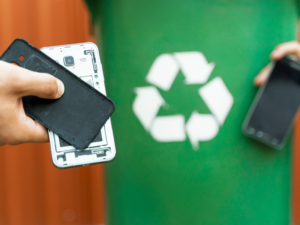If you were only allowed to use one modern technological device for the rest of your life, what would it be?
For many of us, the answer would probably be our smartphones. It wasn’t that long ago that most families only had one phone to share, and it was usually a landline installed in their home by a phone company technician. Today, though, every family member has their own smartphone, and they take it with them everywhere. To work. To school. On vacation. Even into the bathroom.
More than just phones, these devices are portable computers providing 24/7 access to all the knowledge and communication capabilities of the Internet. What would we do without them?
But maybe a better question is “What are they doing to the environment?”
In an age where we have all this information at our fingertips, this is one question that’s easy to ignore. However, in order to start protecting our planet’s future, more people need to ask this question. Then, hopefully, once we understand the answer to that question, we can start asking an equally important one: “What can we do to repair the damage?”
Keep reading to learn more about the environmental impact of smartphones and what we can do to help this ever-growing problem.
How Do Cell Phones Impact the Environment?
The two big problems with smartphones are the same two big problems facing all modern technology: hazardous materials and people.
First, the manufacturing of so many electronic devices today involves hazardous chemicals that, when disposed of carelessly, pose a major threat not only to the environment but also to human health.
Problem 1: Phones Contain Toxic Chemicals
According to Yawer Malik, digital marketing pro at Cloudways, “Over 1.5 Billion smartphones are being sold in a year, but the recycling process never carries out as compared to the selling ratio. Only 15% of devices are being recycled properly. Smartphones contain hundreds of finite materials that include rare earth elements and minerals. If mobile phones are not properly recycled they can be harmful to human life because they release toxic chemicals and metal into the air and waterways causing harm to people.”
Also commonly used in smartphone manufacturing are things called BFRs (short for “brominated flame retardant”). BFRs are very good for preventing malfunctioning electronics from catching fire. Unfortunately, they’re also highly poisonous to humans and animals, capable of severely damaging both our nervous and reproductive systems.
Problem 2: Irresponsibly Discarding Old Phones
The other big problem is us. Or more specifically, how irresponsible we often are when it comes to getting rid of our old devices. If everyone followed good tech recycling practices, the danger of e-waste would be almost nonexistent. Unfortunately, too few of us do that. Studies show that Americans throw away more than 350,000 phones daily, resulting in 9.4 million tons of e-waste pollution every year.
One reason for this might be because of how few of us know what’s actually inside our phones. More than just plastic and glass, these pocket-sized machines require many components that are as volatile as they are valuable.
Richard Latimer, CEO of Veritas Homebuyers, shared with us that “Smartphone batteries and circuit boards are absolutely horrible for the environment and horrible for humans as well. There are many heavy metals in the printed circuit boards and batteries that include, lead, nickel, beryllium, mercury, lithium, and other toxic metals. When the phone is thrown in the trash and ends up in a landfill the battery will start to corrode and break down. As the phone breaks down the toxic waste leeches into the soil where it ends up in our water supply. Also, Lithium batteries tend to explode when exposed to the elements and cause underground landfill fires to start.”
Responsible phone and tablet recycling practices keep these substances out of our soil, air, and water. However, when such practices are ignored in favor of haphazardly throwing old electronics in the garbage, those electronics usually end up in landfills. There, they gradually deteriorate over time, releasing the hazardous chemicals within. These toxins can then seep into the ground, get carried by rainfall into nearby water supplies, or even travel for miles on currents of wind.
How Can We Reverse the Impact of Smartphones?
As serious as today’s environmental situation is, it’s far from hopeless. In fact, there are many things that both individuals and businesses can do to help reduce the negative environmental impact of smartphone usage.
For starters, we can all make a point of using our devices for longer. Often, the lure of cutting-edge new technology seduces us into throwing out our old phones, tablets, and computers long before they actually need to be replaced. More frequent upgrades not only increase the likelihood of these devices being disposed of improperly it also increases market demand.
The only way for a phone company to satisfy that demand is with increased manufacturing. More manufacturing means more mining for components such as palladium, copper, nickel, gold, and platinum, which means more environmental damage.
The best way for people to do their part to reduce e-waste pollution, though, is by following proper electronic waste recycling practices. First and foremost, that means not simply discarding our unwanted devices into landfills as if they were harmless paper products or spoiled leftovers. Modern technology needs to be handled much more carefully.
Lessen the Impact of Smartphones with E-Waste Recycling
No one knows the importance of proper e-waste disposal better than Newtech Recycling. From the moment we opened our original Bridgewater electronics recycling plant, Newtech Recycling has strived to meet the e-waste disposal needs of New Jersey, Connecticut, New York, and Pennsylvania. Our meticulous recycling program breaks down every single device into component parts. Instead of being left to decay and contaminate our natural resources, these components can then be reentered into the manufacturing process and used in the creation of newer, better electronics.
For more information on how Newtech Recycling can help you dispose of your unwanted technology in an ethical, efficient, and environmentally friendly way, contact us today.



